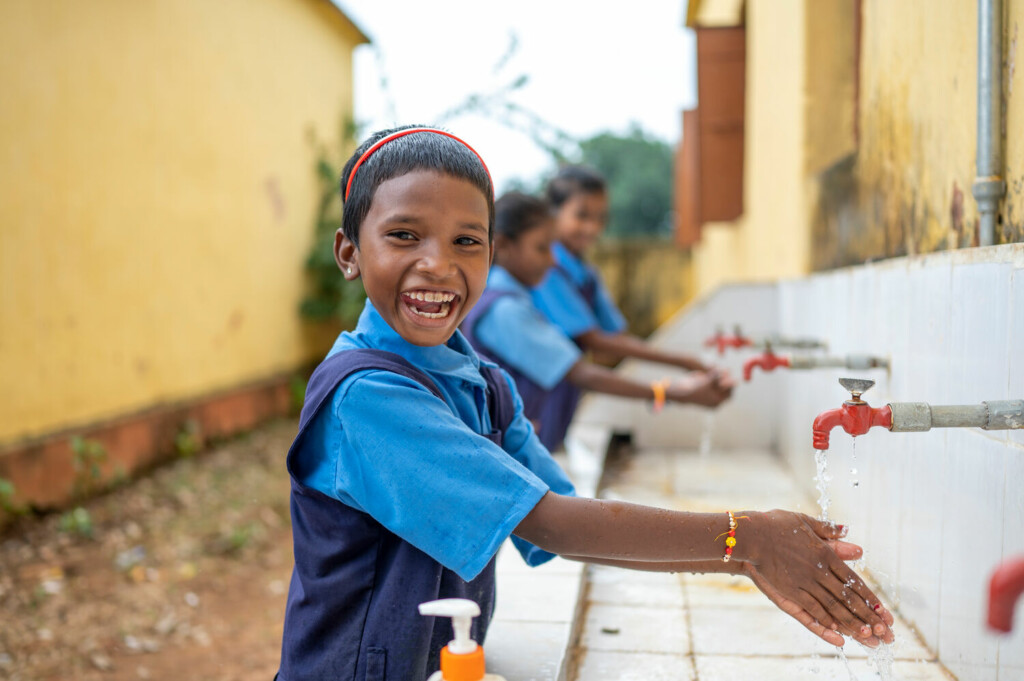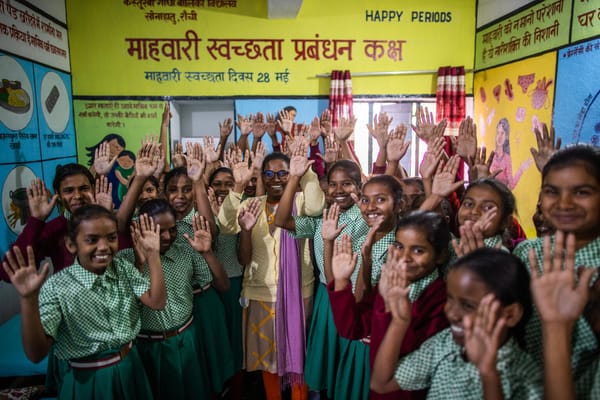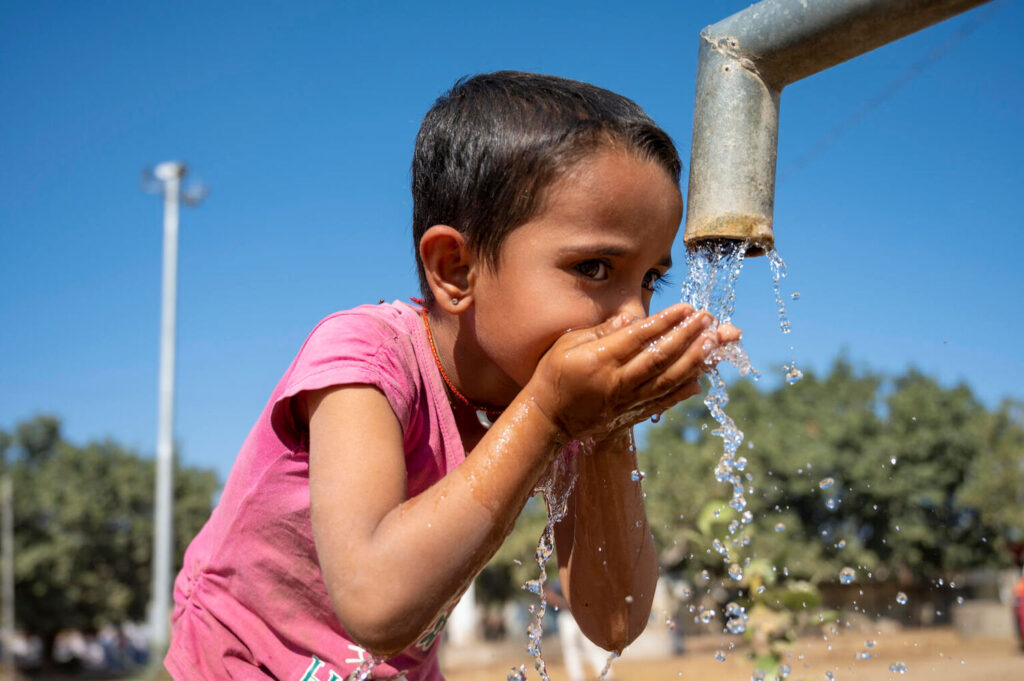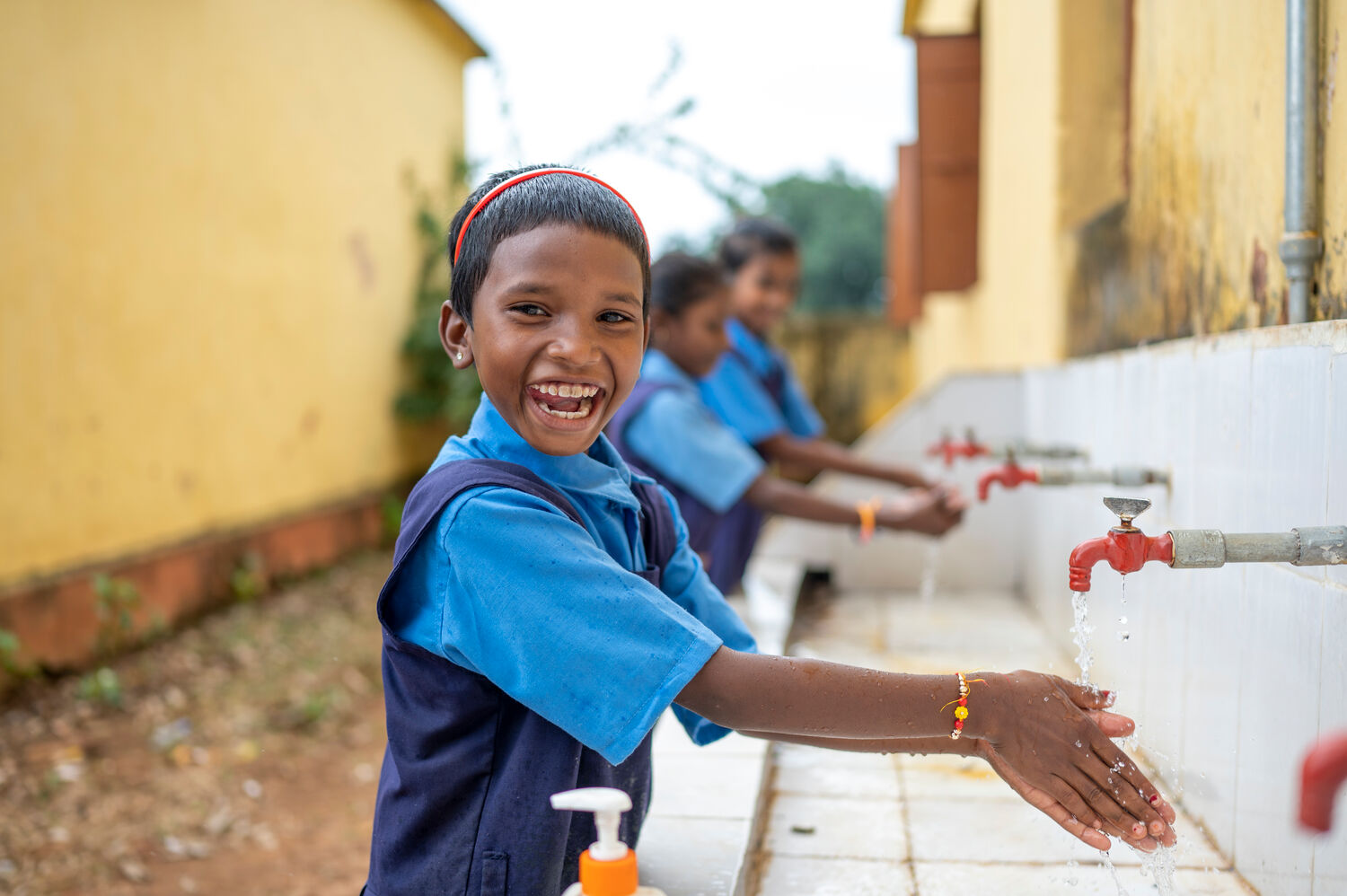
Lindström and UNICEF support India’s WASH programme
Since 2007, Lindström has teamed up with UNICEF Finland to support its efforts in India’s Water, Sanitation, and Hygiene (WASH) program. The WASH initiative aims to provide clean water, foster healthier hygiene practices and deliver sanitation services throughout India. By working alongside Indian children, families, communities and organisations, UNICEF has helped improve the health and well-being of millions of people in India.
Lindström entered the Indian market in 2007 and now operates in 12 cities across the country. However, to us, India is more than just a market; it’s an opportunity to create a positive impact beyond our business activities.
“Right from the beginning we wanted to give back to the community by committing and contributing to raising hygiene conditions for the people. That is why UNICEF has been a natural partner for us already since we started in India,” says Juha Laurio, CEO of Lindström Group.
What is the India WASH programme?
WASH includes all the initiatives, policies and programmes that lead to the core WASH areas of cleaner drinking water, improved sanitation facilities and better hygiene practices throughout India. It involves comprehensive collaboration and planning between various governmental and non-governmental organisations, as well as local communities.
Thanks to the support of donors like Lindström, UNICEF is able to provide technical assistance, funding and expertise to support WASH projects and initiatives. Through targeted programs, UNICEF also works directly with children and families, empowering children to become positive advocates for change in their communities.
Why WASH in India is needed?
Despite significant progress, India still struggles with challenges related to WASH. For example, more than 600 million people will face acute water shortages in the near future, and over 42% of households do not have access to safely managed drinking water. This lack of access places a heavy burden on individuals, particularly girls and women, who often have to travel long distances to collect water.
Moreover, only 28% of wastewater is treated in India. Untreated wastewater is released into rivers and lakes, leading to waterway pollution, the spread of diseases, and unsanitary conditions in communities. Further, nearly half of schools lack basic handwashing facilities, while menstrual hygiene remains a taboo subject in many regions, particularly rural areas.
These pressing issues show the importance of the WASH programme. The main focus of UNICEF and its donors is the health and welfare of the most vulnerable children and their families, and they are also working together to empower women and uplift all people in India.
Key focus areas of WASH in India
UNICEF, as one of the many actors involved with India WASH, sets and implements its goals with government partners, expert organisations and various stakeholders. It has concentrated its efforts on several vital WASH areas, with encouraging results.
- Safe drinking water: UNICEF plays a meaningful role in the Jal Jeevan Mission, which aims to provide safe and sustainable drinking water to every rural household, school and public institution in India. The mission has brought water services to up to 20 million people. UNICEF helps improve access to safe water not only by supporting a clean water supply but taking part in the efforts to train and empower communities.
- Sanitation and waste management: UNICEF also provides support to the Swachh Bharat Mission which encourages toilet use and the safe disposal of waste. The Swachh Bharat Mission has contributed to an estimated 4.4 million people gaining access to household toilets. Additionally, nearly 140,000 villages were declared ‘open defecation-free plus’, signifying a transformation in sanitation practices. As part of their waste management efforts, UNICEF works with local authorities and organisations. The drive in Rishikesh and Haridwar to remove plastic waste from the environment shows how effective these partnerships can be.
- WASH in schools: UNICEF helps promote WASH in schools through infection prevention and control interventions. The efforts of UNICEF and its network of partners led to the training of over 98,000 community-level service providers. Furthermore, the comprehensive national WASH training toolkit was rolled out, benefiting 23,075 schools. These initiatives ensure that schools provide a safe and hygienic learning environment for children.
- Menstrual hygiene management: UNICEF and their India WASH partners helped to reach approximately 12 million people with menstrual hygiene messages during Global Menstrual Hygiene Day in 2022. It also trained more than 19,000 teachers and master trainers in various states across India. This resulted in over 3 million adolescents being educated in menstrual hygiene management. The training of menstrual hygiene peer educators in Uttar Pradesh is among the many successes.
- WASH in healthcare facilities: Ensuring clean and hygienic healthcare facilities is important for the health and well-being of communities. UNICEF has assisted hundreds of public healthcare facilities in integrating hygiene, cleanliness and sanitation practices. Additionally, they formed a new technical partnership with the National Programme for Climate Change and Human Health (NPCCHH) to develop risk-informed and client-resilient healthcare facilities.
- Climate-change resilience: India’s vulnerability to climate change is evident through extreme weather events like cyclones, heavy rainfall, floods, landslides and droughts. Recognising this threat, UNICEF has taken part in developing a climate-resilient water, sanitation, and hygiene strategy. It has worked with various stakeholders and partners, such as the Ministry of Environment, Forests and Climate Change (MoEFCC), the National Program for Climate Change and Human Health (NPCCHH), and intra-UN and youth networks. These partnerships have led to many successes, such as those of climate-resilient WASH efforts in Mangalajodi.
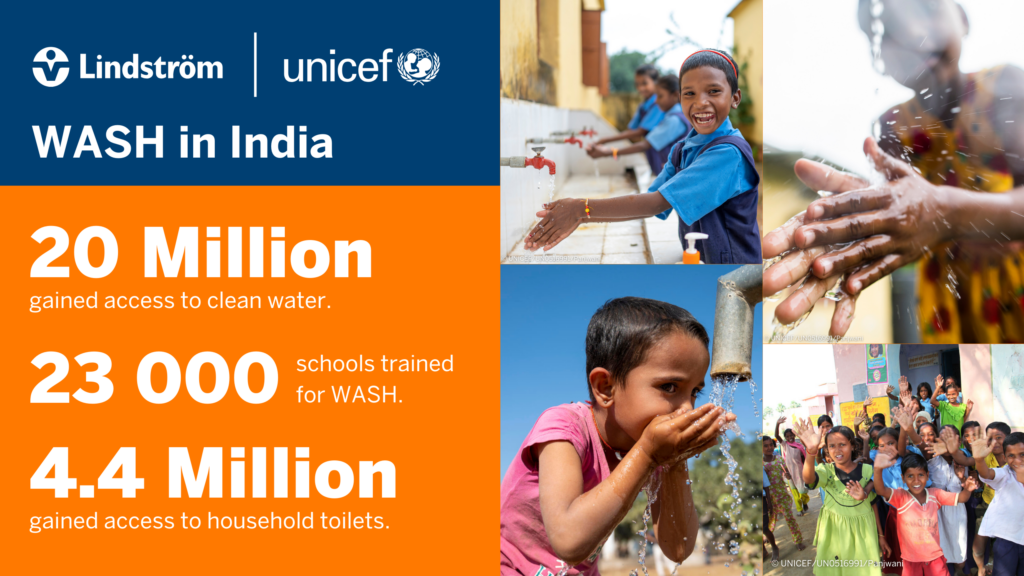
Sometimes UNICEF and its partner organisations have needed to adapt to extraordinary circumstances. For example, UNICEF’s COVID-19 response in India played a role in guiding it through the pandemic. Thanks to the efforts of Indian children, teachers and others, UNICEF promoted awareness about preventing infections and impacted nearly 3.3 million people with crucial WASH services and supplies. Media campaigns highlighting the effectiveness of handwashing with soap also reached nearly 10 million people.
The way forward for WASH in India
Despite the successes, it’s important for all the organisations involved in India WASH to monitor and evaluate their efforts and to identify best practices to contribute to the programme in the future.
Juha Laurio, CEO of Lindström Group, says, “One of the many reasons we value our partnership with UNICEF Finland is because they continually evaluate their efforts, recognizing that the true heroes in the India WASH program are the children. From this understanding, they acknowledge key lessons learned, refine the most effective practices and explore new avenues to empower these young champions.”
In technical matters, UNICEF wants to ensure the accuracy of data and reported numbers, which is essential for informed decision-making. It also wants to continue collaboration with India WASH stakeholders to provide technical support for important projects, such as the safe containment of faecal sludge.
At the heart of UNICEF’s work, however, is building up the capacities and knowledge of individuals, particularly children and those who are central to children’s lives. Continued ‘Capacity building’ – that is, strengthening the skills, knowledge, abilities and resources of individuals, organisations and communities – is an important part of meeting WASH goals. Furthermore, campaigns and communication efforts that provide information, raise awareness and encourage healthier behaviours in individuals and communities need to continue.
While UNICEF and other organisations play a meaningful role in Indian WASH, it is the active involvement of Indian children, families and their communities that drives transformation. Continuous long-term investment in individuals and communities, particularly those in the most remote areas, is therefore important in bringing about lasting change.
Making a positive impact
At Lindström, we strive to make a positive impact wherever we do business. We do this not only through our sustainable and socially responsible business practices, but in our support of local communities.
Marja Riitta Ketola, Executive Director of the Finnish Committee for UNICEF, says of Lindström’s long-term partnership with UNICEF Finland, “This kind of long-term support is very valuable for us, as it allows strategic planning to achieve sustainable results. Lindström has been supporting UNICEF’s program in India that aims to ensure that children have safe access to water, sanitation and hygiene to keep children safe and healthy. When children are healthy they can stay at school, learn and reach toward their dreams.”
We are proud to partner with UNICEF Finland in supporting UNICEF’s work in India to create a healthier, more prosperous India.
